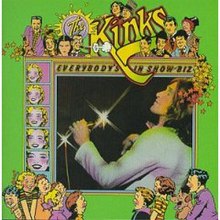Thursday, May 11, 2017
The Kinks, "Celluloid Heroes"
I've noticed that the Kinks are disproportionately represented in my tracks of the week. Reflecting on that fact, I think the reason why is that Ray Davies lyrics and themes leave a lot more room for discussion than the music of most others. I am also a sucker for culture as social observation, and the Kinks did that better than anyone in rock history.
They started off as exuberant British invaders with songs like "You Really Got Me" that bashed and burned harder than anything that'd ever hit the charts. Then, in their 1966 to 1971 golden age, they got more wistful, less rocking, and more concerned with documenting life in postwar Britain than making music for a rave up. After Muswell Hillbillies, however, they took a strange slide into a run of ill-conceived and poorly received concept albums. (They eventually righted the ship in the late 1970s with a string of hard rock albums returning to their early roots but with the commentary intact.) I am not a fan of these albums (few are), but the first one, 1972's Everybody's In Show Biz, has some standout songs.
Tops has got to be "Celluloid Heroes," which has the line that gives the album its name. In a rarity for The Kinks, the location is Los Angeles, not England, in particular Hollywood Boulevard. It talks about the Walk of Fame, but with a kind of Davies-ian melancholy as he discusses stars of yore. There's Greta Garbo, who later shunned the spotlight, and Rudolph Valentino, who died young, and those "some that you've hardly ever heard of." Their fame is framed as a struggle, one that took something away from them that they never got back. The goddess of fame is fickle, too: "Success walks hand in hand with failure/ On Hollywood Boulevard."
And it's at that point that the song turns. After reminding the listener of the price of fame, Davies pines longingly to be a "celluloid hero" himself, because "they never feel any pain" and "never die."The music lifts up to become even more anthemic, the longing palpable. By "celluloid heroes" he does not mean Errol Flynn or Marilyn Monroe, but "Errol Flynn" and "Marilyn Monroe," the screen personas that enamor us so. Deep down we know that fame does not bring eternal life and deliverance from personal hardship, but we also want to dream that it can, our modern, secular version of sainthood. I can't think of another song that says it so well.
Subscribe to:
Post Comments (Atom)

No comments:
Post a Comment